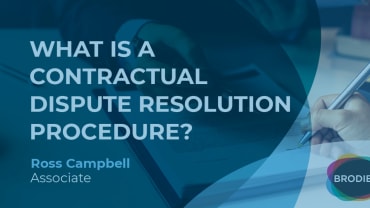Despite best intentions, business disputes can sometimes be unavoidable. My colleague, Fiona Chute, recently set out in her blog some of the factors you may want to consider when determining what methods are open to you for resolving a dispute. Whatever method of dispute resolution you decide is best for your business, it's likely that negotiations of some kind will be involved. But how do you get the most out of those discussions?
Be Prepared
Before commencing negotiations, it is important for your advisers to understand why the dispute has arisen in the first place. Has there been a complete break-down in the business relationship or between individuals within the business? Has there been a contractual breach? What are the strengths and weaknesses of your case (and that of your opponent)? Investing time (and, if necessary, seeking advice to answer these questions) at an early stage will ensure you are in the strongest possible position. Your solicitor will be able to provide tailored guidance and help you to develop a clear strategy which aligns with your commercial objectives. It can be said that litigation is a bit like a game of chess – tactics and strategy are key.
Scope for Agreement?
Is there anything which the parties agree on? Seeking early agreement for certain aspects of the dispute will mean you limit the issues which need to be resolved in court, mediation, or arbitration, saving time and money in the long run. Furthermore, if the parties see progress being made, then they may be more willing to continue with settlement negotiations.
Compromise
It is important to remember that you are 'negotiating' - in most cases it will be in both parties' interests to be ready, and willing, to compromise. Consider what you want out to achieve, and then consider what would you be willing to accept. A successful settlement may include other commercial considerations over and above money; perhaps maintaining the existing business relationship or setting parameters for future deals or contracts. Set clear boundaries and think through your best and worst alternatives. Deciding your bottom-line is important to ensure you are not left disappointed.
Write it down
You should document what has been agreed as you go along and when a final settlement has been agreed, record the terms and prepare a 'Settlement Agreement'. This should be signed by each party. Not only does this give parties certainty about what has been decided, it also gives you the security that if the terms of settlement are not followed through, then you have proof of what was agreed, which can be enforced in court, should that prove necessary.
Negotiating can be difficult and time consuming, since there requires to be a level of trust rebuilt between the parties. A lot can depend on the approach and attitude adopted – on both sides. But by preparing well and taking advice on the strengths and weaknesses of your case at an early stage, negotiations can lead to an earlier and more cost-effective resolution of a dispute and may save you having to move on to a more formal method of dispute resolution.
Contributor
Senior Solicitor












